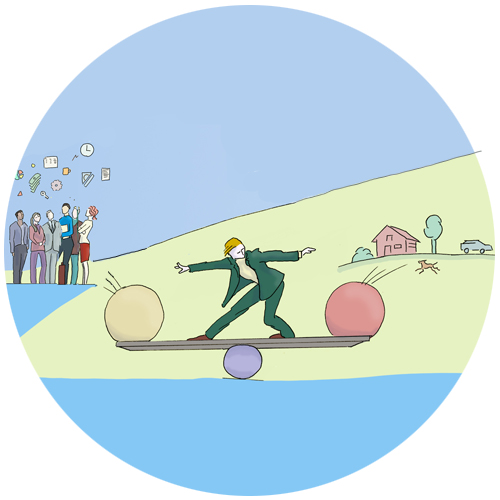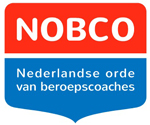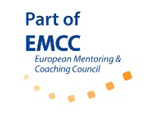Mentoring
Mentoring is a development process where an employee (or manager) is accompanied by a more experienced person. This mentor helps achieve specific professional competencies or goals.
Mentoring, an important part of "workplace coaching", is an individual approach that focuses on both the personal and professional development of the employee. The program contributes to better results by increasing the sustainable employability and well-being of employees. It helps retain talent, prevent downtime, and promotes the growth of both employees and executives.
Powerful HR tool for developmentMentoring
is a powerful HR tool for development and growth and is not self-evident for all employees. It is particularly useful for employees who are self-employed professionals. It is also a valuable addition to the management style of "Coaching Leadership", with the aim of promoting employee independence, responsibility and self-reflection.
Hands-on
Mentoring is very practical. It's about people learning to apply their theoretical knowledge in all kinds of practical situations. This may include experiences with customers, but also dealing with direct and indirect colleagues. Working in a team is something that people sometimes find very difficult. The solution is personal to everyone, but it often has to do with the way they communicate. The organization culture is also of great influence. It is sometimes difficult to find your way around a technically oriented company or, for example, a semi-government such as utilities. The use of mentoring can then help by, for example, discussing difficult situations in substance and addressing them together. The work-life balance is also a topic that is often discussed.
Preparing employees for mentoringOnly
managers need to learn how to mentor, employees will also need to do work to benefit from mentoring. They need to understand their personal and professional goals. In addition, they must show a willingness to look critically at their own behaviour and performance. Furthermore, mentoring requires an active commitment and involvement of the employee.
Steps and cautions
1. Set the goal and expected return: Clearly define what you want to achieve with mentoring. This can range from reducing absenteeism to broadening knowledge of the content.
2. Choose the right Mentor: Create a personal click between mentor and employee.
3. Three-way or Four-way DialoguE: A conversation between employee, mentor, supervisor (and possibly HR) can increase the effectiveness of the mentoring by a direct translation into practice.
4. Create a clear Mentoring agreement: A clear contract avoids surprises in terms of objectives, confidentiality and costs.
Internal versus External MentorenInterne
mentors are very suitable to educate new people within the orgnisation and processes. The use of external mentors can work well in guiding professional employees, individual managers or through heavy processes that require objectification. For example, about the course of the organization, or accompanying reorganizations. The working relationship between the external mentor and mentee is of course very important.
Care points in- external mentors
Interne Mentor:
Advantages : knowledge of the organization and easy access.
Disadvantages: Possible conflicts of interest and challenges in confidentiality.
Use : often used for onboarding, skills learning and practical questions.
Externe Mentor:
Benefits: Broader perspective and not part of internal systems.
Disadvantages: Higher costs, but these need to be compared with possible higher yields.
Use: Suitable for personal development questions, career development and confidential topics.
Mentoring for more professionalMentoring
is a valuable tool for organizational development. Careful implementation and selection of the right mentor are essential to the success of the program. Managers and/or HR Advisors should be aware of the differences between internal and external mentors and develop a strategy that is appropriate to their organization's specific needs and goals.

Choice: same or development.
The reason for choosing guidance in the form of mentoring is different for everyone. Without wanting to be exhaustive, we mention a number of them. A good reason is a new job or another job. For example, you will work as a manager. Then the development of your personal leadership style will be discussed. The development of this in combination with your character, values and norms is very important for success. Sometimes someone is more or less forced to do something else by, for example, a reorganization or a limitation.
But often someone has the feeling that there is more to it. Shaping the need for development. Taking more direction, developing skills, learning to deal with an administrative / legal environment are a few practical examples.
Choosing development or change is sometimes necessary, but above all positively challenging.

Awareness of the work situation.
In order to develop or change, it is important to gain insight into the current situation. What are your talents, values and norms? And how do you apply it in practice. Which roles do you currently fulfill, business and private. What is your character, your ambitions and how is it with your sense of responsibility? The insight obtained in this phase of awareness forms the basis for the interpretation of your future (business) life. A function that suits your character and style of management ultimately gives the most satisfaction. Not only with yourself, but also for the organization.

new skills.
Based on the insights gained, we will work on issues such as insight into processes, style of work, workload and stressful situations. But agenda management, meeting techniques and collegial and administrative relations will also be reviewed. In this phase we will also regularly pay attention to external influences from suppliers, customers and social developments. Regular evaluation of complex issues gives confidence and broadening of knowledge and practical experience.

Balance sheet work, person and private.
It is a challenge for anyone who participates in the work process to find the right balance between Work, Private and Personality. These three important pillars determine your well-being. An imbalance in two of the three pillars ensures that you will function on stress hormones. They will exhaust you, so that you increasingly get the feeling that you have no energy. It is precisely this energy that is important for the proper functioning and performance. In the mentoring process, we will combine the insights from the awareness phase with the practical experiences. In the meantime, you have also learned to deal with complex issues and processes. Instead of stress, there will be an increasingly good sense of satisfaction. A number of insights obtained are also applicable in the private situation, so that an improvement also occurs here. All this ensures a good and healthy balance between Work, Private and your personality.

leadership and direction.
The result of the phases discussed earlier is a clear picture of your talents, character and style of work. This makes you better able to handle things at the right level in a timely and qualitative manner and you manage to keep strict control over all parties involved. In a way that does justice to the organization and your job satisfaction. Of course, the positive development also has a good influence on your personality and your private situation.

Accountability and decisiveness.
During and after the mentoring process, you will notice that you have gained more insight into yourself, work processes, practical problems and possible solutions. For example, which makes you better able to recognize and capitalize on opportunities. You will enjoy working and, above all, continue to work with your personal development. As an individual and as a project leader, entrepreneur or manager.

Entrepreneurs
As an entrepreneur you face new challenges every day. We support where necessary when it comes to, for example, leadership style, personal affairs, organizational issues and personal development. Often also balancing the pillars Work, Private and Personality.
Manager
The position of a manager is an important factor in an organization. Dealing with the amount of responsibility, control tasks, quick solutions, guiding people ect. sometimes makes it difficult. Regular sparring with your mentor makes you less vulnerable, creates an overview and helps with personal development.
Project leaders
Realization of the project is the goal, but the way in which it can often differ. Many project leaders start very ambitiously, but lose the overview due to workload and complexity. The experience of a mentor provides an overview, peace and a smooth course of events, so that a good result is achieved.
Futura Esperanza
In addition to our broad experience, we also support people using the Futura Esperanza method developed by ourselves. This program has now amply proven itself when it comes to awareness, balance, personal development and dealing with social aspects.





